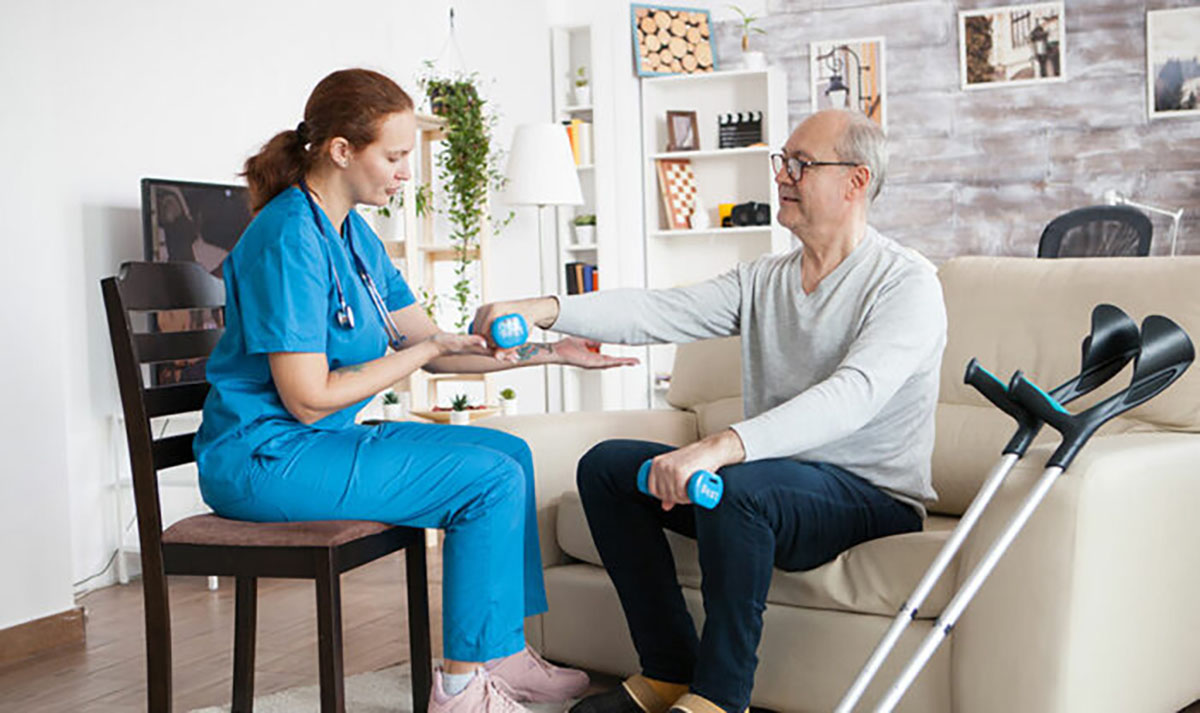
Benefits of Home Health Care For A Senior With Diabetes
Don’t deal with your diagnosis alone.
If you or your loved one has just been diagnosed with type 2 diabetes, you may feel overwhelmed, confused or unsure just where to start in managing the condition. Skilled home health care professionals, like those with CorsoCare Home Health, are here to help.
From providing resources, to helping you better understand your diagnosis, and working side by side with your primary care physician, and more, skilled home health care is a resource that can help you manage diabetes in the comfort of home.
Managing Type 2 Diabetes For Seniors
Diabetes is a chronic condition that affects how the body transforms food into energy.
Our bodies turn food we eat into sugar, called glucose. This glucose is our bodies’ main source of energy, but in order to turn this sugar into energy, we need insulin. When our bodies release insulin from our pancreas, the insulin helps glucose leave our bloodstream and enter our cells.
If you have diabetes, your body doesn’t make enough insulin or can’t use it as well as it should. When there isn’t enough insulin or when cells stop responding to insulin, too much blood sugar stays in your bloodstream. Over time, that can cause serious health problems, such as heart disease, vision loss, kidney disease and more.
The most common type of diabetes among seniors is type 2.
Type 2 diabetes is the most common type of diabetes. It occurs when the body does not use insulin properly, creating an insulin resistance. As a result, blood sugar levels can become too high. Type 2 diabetes can be managed through a combination of lifestyle changes, such as diet and exercise, and medication.
Some symptoms of type 2 diabetes in seniors include:
- Increase in thirst and urination.
- Fatigue.
- Slow healing sores.
- Dizziness and/or fainting.
- Headaches.
- Numbness in hands and feet.
- Blurry vision.
- Increased appetite.
- Gum problems.
- Dry mouth.
Are you experiencing these symptoms? Have you or a loved one been diagnosed?
In order to manage your type 2 diabetes, it’s important that you lead a healthy lifestyle, follow your treatment plans and be conscious of your blood glucose levels.
Here are a few other tips for managing your type 2 diabetes:
- Get educated on diabetes and what it will mean for you.
- Follow your treatment plan.
- Choose foods that are low in carbs and added sugars.
- Exercise regularly.
- Track your glucose levels.
- Consult your health care providers with any changes in your symptoms.
How Can Skilled Home Health Care Help?
While type 2 diabetes may seem like a lot to manage, you don’t have to do it alone. Skilled home health care professionals can help seniors and their families navigate their type 2 diabetes diagnosis, manage medications and treatment plans, and provide resources with everything you need to know.
How else can skilled home health care professionals help? Here are a few ways:
- Empower you to practice self-care, so you can better manage your symptoms at home and identify early signs of complications from type 2 diabetes.
- Address other illnesses that may impact or be impacted by your type 2 diabetes, such as heart failure and high blood pressure.
- Teach you to monitor your blood sugar levels and recognize when (and how!) to help your levels return to normal range.
- Provide diabetes resources and education on healthy habits, including lifestyle changes, wellness, diet, exercise and medication management.
What’s Offered With CorsoCare Home Health?
There’s no cure for type 2 diabetes, but when it’s managed correctly, seniors who are diagnosed with type 2 diabetes can effectively manage their diagnosis.
Skilled home health care professionals are here to lend a hand.
When you choose to seek help from skilled home health care, your diabetes care plan may include:
Skilled Nursing
Skilled nursing refers to the aspects of a patient’s care that can only be performed by a licensed nurse. For a senior with type 2 diabetes, this could include reading the results of your blood sugar checks and assessing next steps.
A skilled home nurse can work with other members of your home health team to:
- Recommend disease and medication education.
- Minimize diabetes complications.
- Provide lifestyle and treatment recommendations.
Occupational, Physical and Speech Therapy
Did you know that type 2 diabetes can cause numbness in your hands and feet? A physical therapist would.
Alongside other specialized therapies, such as occupational therapy and speech therapy, these professionals coordinate care to:
- Improve mobility.
- Create personalized fitness plans that work into your lifestyle.
- Help you recover after a fall or injury.
- Encourage you to follow your diabetes care plan.
- Manage physical symptoms of type 2 diabetes.
Home Health Aide
Home health aides are supervised by medical practitioners, typically nurses, and can provide multidimensional home care to patients in the comfort of their own home.
- Assist with activities of daily living (ADLs), such as bathing, grooming, and dressing, that have been impacted by your diagnosis.
- Report changes in symptoms and progress to your health care team.
Medical Social Worker
Medical social workers work alongside patients and their families to navigate through difficult decisions, with crisis management and advice regarding the American health care system. They can also:
- Offer financial assistance.
- Provide community resources.
- Educate seniors and families about the social and emotional aspects of diabetes care.
Is Home Health Right For You?
The reasons for choosing skilled home health care are different for everyone. Some may want assistance managing their medication, while others might prefer to receive care in the comfort of their own home.
For seniors with type 2 diabetes, knowing when the right time is to rely on skilled home health care can be challenging.
Do you agree? It may be time to consider skilled home health care if you or your loved one has experienced any the following:
- You were recently diagnosed with type 2 diabetes and are feeling overwhelmed.
- Your type 2 diabetes symptoms are affecting the way you live your life.
- Your type 2 diabetes symptoms have become difficult to manage on your own.
- You often find yourself missing medications or forgetting to check your blood sugar.
- You feel anxious or depressed about managing your type 2 diabetes yourself.
